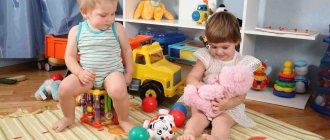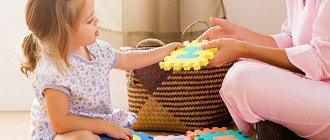Hello, loving mothers and fathers. We are used to raising children in the same way we were raised. Did our parents know what is now available to us? I understood the nuances of the development of small children. What is the upbringing of a 2-3 year old child: psychology, expert advice for your attention. Want to figure it out? Then let's go!
Let's start with the worst thing - hysteria
When you read child psychology, you get the feeling that crises won’t end until you’re 18, or maybe until you’re 100... As soon as we successfully survived the crisis of 1 year, a new one immediately began.
“What to do so that your child listens without yelling at him” Free online course from SEPTEMBER 18 to 21, which will sell the popular course “A flexible child and a calm mother in 2 months” Free online course
We dealt with hysterics easily. If the baby started to get hysterical, we put him on the bed, he screamed for about 5 minutes, then he calmed down. When he calmed down, he got out of bed and came to me to hug. Moreover, the entire time he was crying, no one held him; he lay there on his own until he calmed down. At 3.5 years old the hysterics stopped. Another type of hysterics is when a child screams and gets angry and wants to somehow direct this anger at you, either to hit or bite. This rarely happened to us, but when it happened, I took him in my arms and hugged him tightly, he calmed down in 1-2 minutes.
At this age, or more precisely under the age of 5, children do not know how to control their emotions, they learn to do it.
The main thing is not to lose your temper; it is better to take the child to another room and wait while he cries than to hit him in the butt. Since this method, firstly, does not help. Secondly, physical punishment works up to a certain age. Thirdly, you will lose a trusting relationship with your child and undermine your authority. After all, when he was feeling bad and difficult, you didn’t help, but took advantage of his defenselessness, used force, didn’t show an example of behavior, but chose a simple way to solve the problem that was convenient for you. The child will not forget this, and if he does, this event will become part of his life, will remain in the subconscious, and will be written down as a program of behavior in such situations.
How to Respond to Tantrums to Earn Points
Why physical punishment is a bad method
As soon as the child becomes physically strong and can fight back, he will either do so or simply leave. Thus, during adolescence you will not have an instrument of influence. And if he does something bad, and at this age it’s not just getting dirty in a puddle, you won’t be able to protect him in any way from a bad situation or influence, because you don’t have authority and aren’t able to solve problems. And it will be more difficult for you to solve problems in a different way other than yelling and fighting, because you are used to this simple method. And after 40 years, when you are already more dependent on children, when you need pity, perhaps support, the child will not feel pity for you, understanding, and will even experience irritation with any problem or reminder of you.
If the baby loves to listen to fairy tales, then at this age therapeutic fairy tales are very helpful, with the help of which in the evening, before bedtime, when the child is already calm, you can discuss all the conflicts that occurred during the day and show the child how, using the example of the hero of the fairy tale, he can come out from the situation, how to resolve conflicts, how to avoid hysterics.
Educational games - as an element of raising a child under two years old
A two-year-old child does not yet understand what is good and what is bad, and the main responsibility of every parent is to explain this to him.
The simplest games with an educational element that you can play with a child from one to two years old:
- Girls love to play with dolls from a very young age. Help your daughter dress the doll, feed it and bathe it. Important: it is best to buy a large rag doll, without small parts.
- You can instill a love of order in boys by playing “parking.” After the game, all cars must drive into the parking lot, the role of which can be played by a table or a cardboard box.
- When doing exercises with your child, encourage the correctness of the exercises. Important: the exercises should be very simple, for example: “sway in the wind”, or “grow and become a tree”.
Accustoming to order should begin at the age of 2.
After playing, always collect the child’s toys in a specially designated place and ask the child to help you.
Some development features
It’s interesting to observe different styles of parenting and interaction between mother and child on playgrounds. One mother is too strict, while the other is completely oblivious to her offspring’s misconduct. Why is this happening? A child, of course, is a blank slate on which you can draw what you need, but after giving birth myself, I radically changed my mind.
Much depends on the temperament of the baby, his mother.
It is difficult to keep a hyperactive child in place; parents are exhausted and complain about activity and restlessness. But I can make you happy a little. The diagnosis of hyperactivity itself is made by a psychiatrist quite rarely, and excessive mobility and impatience go away on their own, by adolescence. It is important to accustom the fidget to a routine so that the child learns to plan his time. Some features of the development of children 2-3 years old:
- The child learns about the world through imitation. An adult is a standard. Don’t ask where THIS suddenly came from (gesture or action). Everything from you, dear parents.
- The leading type of activity is with objects (the baby will reach out to his peers closer to the 3-year mark). Help your child discover new things, show what can be done with objects.
- Active development of speech function. If before 18 months speech is formed quite slowly, then after 2 years the baby can consciously perform complex actions at the command of an adult. Passive vocabulary is expanding rapidly. The baby shows interest in the conversation of adults, listens attentively, tries to understand what they are talking about.
- During this age period, the child gradually learns to master the norms of behavior that are accepted in society.
- The child’s actions are involuntary, spontaneous, he does not plan in advance to take away a toy from someone, this decision comes to him suddenly. Children are not yet able to plan their actions.
- The baby begins to actively use facial expressions when communicating with peers and adults.
- Gets to know your body. Studies its properties in different positions.
The child is easily charged with the feelings of other children if someone nearby is crying and your baby may scream loudly. But he still does not know how to empathize, to put himself in the place of another.
Magic pill
Who among us did not dream as a child of a magic pill to make some dream come true? It’s so great - you took a pill, and all possible knowledge is in your head. Or, for example, I learned to play the violin. Well, or he just became a good person. But in real life, things are not so simple. In order to change for the better, you need to work long and hard on yourself.
What do we have to do with it? We're talking about raising children, aren't we? For some reason, some parents believe that a child has been born, is growing, there is still a lot of time before he comes and says: “Mom, dad, I’m an adult now.” And this means that you don’t have to rush with upbringing, you’ll have time. Or they think that one day a miracle will happen and their child will suddenly become a wonderful person and generally a unique personality. Only here we need to work. Climb over all surmountable and insurmountable obstacles, experience puberty and work, work. After all, if you want your wonderful baby to become an equally wonderful person, know that your contribution to this transformation must be huge. And you need to start as early as possible.
How to educate correctly?
No, I won’t be able to give you an exact answer to this question, but I’ll probably be able to determine the main directions of educational activities.
Speech and physical development
If the baby does not speak, but understands the spoken word, is able to follow the commands and requests of an adult, actively imitates, looks straight into the eyes - there is nothing to fear. He’ll start talking a little later, you won’t be able to close your mouth, believe me (I was just such a silent person). Read more fairy tales, poems, folk nursery rhymes. Develop fine motor skills.
Remember, for faster speech formation, the overall physical development of the baby is important. Along with finger games, teach your child to climb stairs and ride a small tricycle. If you can’t pedal, I recommend the article WHAT TO DO IF A CHILD WILL NOT PEDALS
Sensory development
This is the knowledge of the forms and properties of objects. When buying a sorter, pay attention that it should not have more than 4 different shapes (that’s enough for a start). First, you name the child a shape (circle, square), introduce it, then use your finger to outline the boundaries of the shape and lower it into a suitable hole. Allow the baby to pour water and pour objects from one form to another. Just prepare the area in advance to make cleaning easier. Cut it out. Glue, draw simple geometric shapes. Roll sausages and balls from plasticine. This is what needs to be done in early preschool age.
Patriotic education
It’s hard to imagine how you can tell a 2-year-old child about Russia. But it is from childhood that the foundations of morality are laid. Develop noble feelings for yourself, turn to the origins of national, moral culture in everyday life. Children quickly remember everything and absorb it like a sponge. The simplest patriotic education is cartoons, old Soyuzmultfilm cartoons, filled with bright, strong images of real heroes, strong women (“blue eyes”, “wild swans”).
Musical development
Children love to dance to music. Organize exercises every morning and a small disco in the evening. Select the music carefully; it should have a clear rhythm and a restrained tempo. Teach your baby to squat, put his foot on his toe or heel, spin around himself, and jump merrily. Develop your hearing and coordination of movements.
Environmental education
I have already written that the standard for a baby in early childhood is an adult. So you will have to educate yourself rather. Explain to your child that littering is bad, show by personal example. It is best to establish a caring attitude towards nature at the very beginning of your baby’s life.
Moral education
At the age of 3 years, it is already possible to instill in children a love for their native places and develop citizenship. You should start with the development of self-respect, nobility in relation to others in everyday life, and the study of national culture. If you present it in an interesting way, children will quickly learn everything. The easiest way to instill patriotic education is through animation. There are many cartoons, both modern and Soviet, that convey noble and strong images of knights, Russian heroes, as well as brave women prone to self-sacrifice.
Features of behavior
Mothers may continue to complain that their baby falls asleep poorly, for an hour at a time , turns around in the crib for a long time, and screams in his sleep at night. Come up with a ritual after which you put the baby in bed. Avoid active, outdoor games before bedtime. Drink tea with chamomile, mint or lemon balm. Sleep will gradually improve and by 2.5-3 years it will return to normal. Perhaps you go to bed too late and the child is already overtired. This is exactly what happened to us. After we started going to bed an hour earlier, we began to fall asleep without hysterics.
Features of behavior include disobedience, frequent hysterics, screaming, confrontation and stubbornness. These are signs of a crisis period of 3 years. Crisis periods are necessary for the baby, the main tasks of development are not to harm, but to help pass this difficult path without losses.
Also during this period, the child may refuse to eat on his own; I have already written about how to overcome this and how to teach the baby to eat on his own.
Let's talk about the daily routine
Previously, the regime was treated with full responsibility. There was a regimen for feeding babies - strictly according to the clock. And it doesn’t matter whether the baby screams from hunger or, on the contrary, doesn’t want to eat, he needs to be fed by the hour. If he needs to sleep on time, he needs to be put to bed urgently. It’s okay that he is cheerful and cheerful, and there is no sleep in either eye. It is necessary to put him down, and that’s it – the regime, after all.
Now the attitude towards this has changed. Observing dystrophic and nervous babies, doctors came to the conclusion that each child has his own regime, which depends on individual characteristics. And if some baby needs 6 feedings a day, then another needs all 8. Some eat more, some eat less. Some babies maintain three sleep periods until they are a year old, while others may only sleep once or twice by this time.
In order to determine the time limits for getting up and falling asleep, parents do not need to set any goals for themselves. Go to bed at 21:00 or 21:30. A child at an early age carries out all his activities according to the needs of his body. He eats when he is hungry, plays when he is alert, and sleeps when he is tired. By gradually adjusting the time frame, parents will see that the child himself can wake up and fall asleep at a certain time. The same goes for feeding. Over time, the child develops his personal diet, which will gradually change as he grows up.
What should parents do, advice from psychologists
The main thing is to remain calm. Things to remember:
- do not practice physical punishment;
- punish after the fact, and not after some time, the baby simply will not connect these two events;
- teach independence;
- encourage the baby. At this age, the baby may already feel a sense of pride when he is praised;
- do not contradict in matters of education;
- establish a routine;
- spend a lot of time outdoors;
- when offering something, provide the right to an imaginary choice (will you do this? - or that?);
- do not be led by hysterics (tears for the sake of tears).
The right to choose helped us a lot.
A child, for example, does not want to go for a walk. Don't ask this question at all if you need to go. And ask, for example, “what hat will you wear.” When the baby gets the right to choose, he will immediately calm down because he was listened to. But under no circumstances ask him if he wants to go for a walk if you absolutely need to go to the store, because if he answers “no” and you go anyway, it will be traumatic for him, and you will thus not recognize his opinion. Did you like the article? I tried to fill the article with bright, joyful photos so that you remember that hysterics do not last forever. And there are many joyful and pleasant moments, and the more of them, the calmer and more cheerful you are. You just need to wait out this age and behave with dignity, so that the child has an example of how to behave in crisis situations and how to control their emotions.
Share the article on social networks and discuss controversial issues together.
After all, as you know, truth is born in a dispute. Have a nice day everyone, and I'm off to play with my son! The book “How to set rules and boundaries of what is permitted for a child” and additional educational materials for parents A step-by-step guide for parents of children from 1.5 to 7-8 years old. A professional psychologist with 17 years of experience will reveal simple steps that will allow you to explain any rules and restrictions to your child so that they understand, accept and follow them. [format - e-book (PDF), 30 pages + additional bonuses and gifts] Online book
Potty training difficulties
When your child turns two years old, potty training should begin actively. Some children start using the potty earlier, others later. There is no specific norm here. If you put in patience and effort, the result will definitely appear.
Potty training should begin at 1.5 years of age
Tips for potty training parents:
- Accustoming should begin at about a year, maximum at one and a half years. However, results are most often achieved by two to two and a half years. When teaching your child, avoid pressure, be friendly.
- The potty should be placed in a convenient place accessible to the baby.
- At home, take off your baby's diapers. At first he will make puddles all over the house, but soon he will understand where they need to be made.
- Place your child on the potty when his desire to go to the toilet is clearly noticeable. If the child is busy playing, and you tear him off and forcefully put him on the potty, training may be significantly delayed.
- Transformable pots have appeared on sale. The child can first use it like a regular potty, and then sit on a potty attached to the toilet.
Transformable pot 3 in 1











